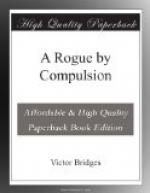Still there was no sense in getting more soaked than was necessary, so I began to hunt around for some sort of temporary shelter. I found it at last in the shape of a huge block of granite, half hidden by the brambles and stunted trees which had grown up round it. Parting the undergrowth and crawling carefully in, I discovered at the base a kind of hollow crevice just long enough to lie down in at full length.
I can’t say it was exactly comfortable, but penal servitude has at least the merit of saving one from being over-luxurious. Besides, I was much too interested in watching the steady thickening of the mist outside to worry myself about trifles. With a swiftness which would have been incredible to any one who didn’t know the Moor, the damp clammy vapour was settling down, blotting out everything in its grey haze. Except for the dripping brambles immediately outside I could soon see absolutely nothing; beyond that it was like staring into a blanket.
I lay there quite motionless, listening very intently for any sound of my pursuers. Only the persistent drip, drip of the rain, however, and the occasional rustle of a bird, broke the silence. If there were any warders about they were evidently still some way from my hiding-place, but the odds were that they had postponed searching the wood until the fog lifted.
For the first time since my leap from the wall I found myself with sufficient leisure to review the situation. It struck me that only a very hardened optimist could describe it as hopeful. I had made my bolt almost instinctively, without stopping to think what chances I had of getting away. That these were meagre in the extreme was now becoming painfully clear to me. Even if I managed to slip out of my present hiding-place into the still larger woods of the Walkham Valley, the odds were all in favour of my ultimate capture. No escaped prisoner had ever yet succeeded in retaining his liberty for more than a few days, and where so many gentlemen of experience had tried and failed it seemed distressingly unlikely that I should be more fortunate.
I began to wonder what had happened to Cairns, the man whose dash from the ranks had been responsible for my own effort. I knew him to be one of the most resourceful blackguards in the prison, and, provided the civil guard’s first shot had failed to stop him, it was quite likely that he too had evaded capture. I hoped so with all my heart: it would distract quite a lot of attention from my own humble affairs.
If he was still at liberty, I couldn’t help feeling enviously how much better his chances of escape were than mine. In order to get away from the Moor it was plainly necessary to possess oneself of both food and clothes, and I could think of no other way of doing so except stealing them from some lonely farm. At anything of this sort I was likely to prove a sorry bungler compared with such an artist as Cairns. He was one of the most accomplished cracksmen in England, and feats which seemed impossible to me would probably be the merest child’s play to him.




